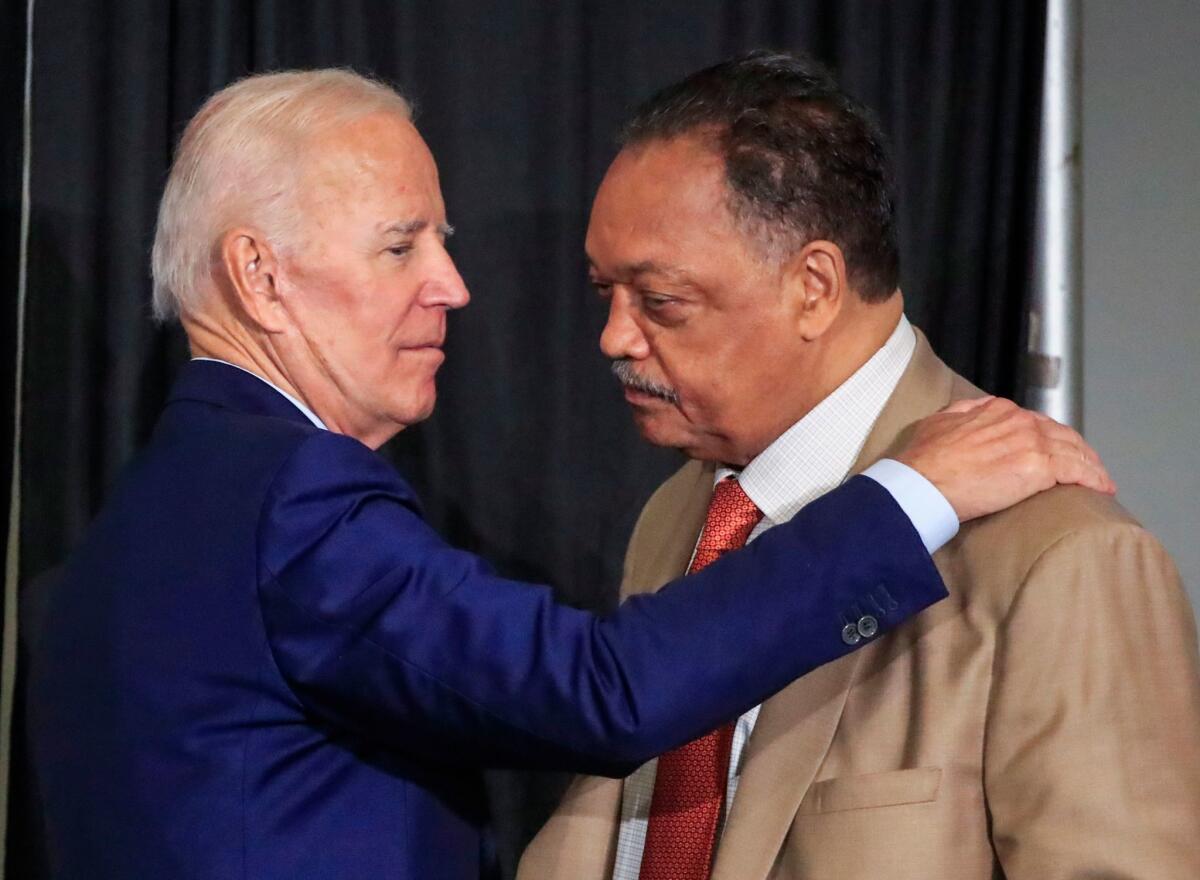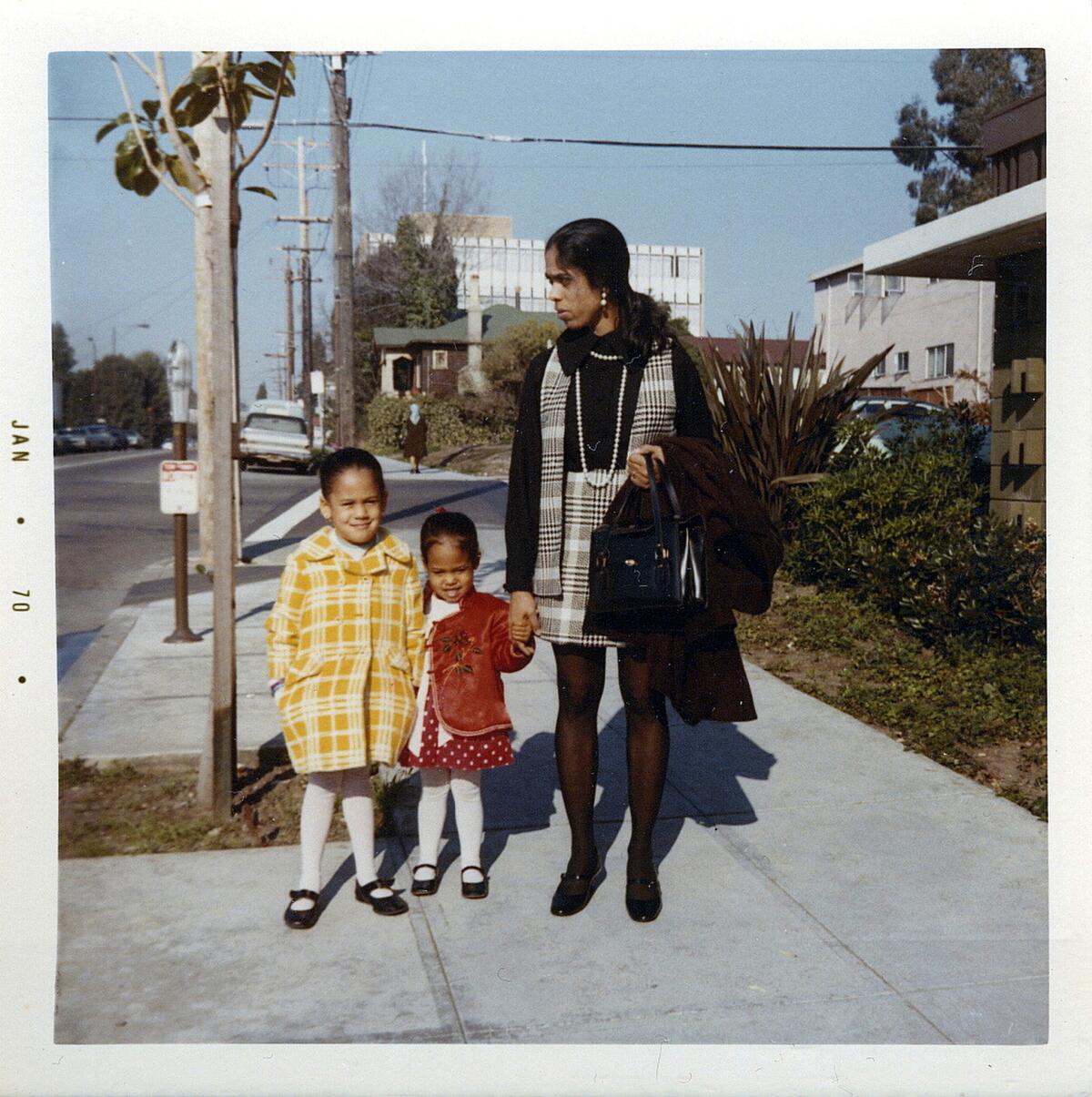Joe Biden struggles and Kamala Harris surges after clash over race and busing

- Share via
Reporting from Chicago — Joe Biden struggled Friday to overcome renewed doubts about his presidential candidacy and his place atop the field of Democratic hopefuls as Kamala Harris, fresh off a commanding debate performance, continued to question his record on civil rights.
The former vice president rolled out the endorsement of Atlanta’s black mayor, Keisha Lance Bottom, and appeared before black labor leaders in Chicago, where he insisted that “the discussion in this race shouldn’t be about the past.”
“We all know that 30 seconds to 60 seconds on a campaign debate exchange can’t do justice to a lifetime commitment to civil rights,” Biden told a gathering of the Rev. Jesse Jackson’s Rainbow PUSH Coalition, a campaign stop scheduled before his Thursday night clash with Harris over his opposition to federally mandated busing.
But even as he sought to undo the political damage, Biden courted further backlash when he spoke, inartfully, of a more broad-minded society in which people realize the “kid in the hoodie might be the next poet laureate and not a gang-banger.”
The crowd of more than 100 or so sat largely stone-faced and silent throughout much of his remarks.
Not long after, NPR surfaced a 1975 interview in which Biden, then a 32-year-old freshman senator, voiced support for a prospective constitutional amendment to halt court-ordered busing to integrate the nation’s segregated schools — a revelation that suggested the controversy would persist.
Joe Biden’s nostalgic remark about segregationist senators draws criticism »
Before this week’s two-part debate, many questioned whether the events would have much impact on the Democratic contest, which appeared fixed in a pattern: Three candidates in their 70s — Biden and Sens. Bernie Sanders and Elizabeth Warren — enjoying a clear lead over the rest of the sizable field. Too many contestants, the thinking went, too little time.
But that changed when Harris, who has faced her own campaign struggles, scolded Biden for his opposition as senator to 1970s-era busing and related her own experience with integrated schools growing up in the Berkeley flatlands.

On Friday, Harris made the rounds of morning TV shows, where she stated her respect for Biden even as she renewed her criticism. During the debate, Biden accused his rival of mischaracterizing his stance. “I did not oppose busing in America,” he said. “What I opposed is busing ordered by the Department of Education.”
Whether conscious or not, Biden’s statement echoed the segregationist argument that states’ rights supersede federal law, a fact Harris seized upon.
“I was actually a bit surprised to hear how he described, in defense of his position, his perspective on the role of federal government,” she said on MSNBC. “Which is why I said, ‘Look, we have so many examples in history where states have limited or restricted people’s civil rights.’”
The confrontation and its aftermath promised to reshape perceptions of the Democratic presidential race, if not necessarily the underlying dynamic or the fact that votes won’t be cast for seven more months — plenty of time for a candidate to rise, fall and rise again.
Even in Chicago, where Biden spoke for several minutes without a clap or cheer while recounting his history on racial issues, the besieged candidate had his defenders.
Tracy McLemore, 52, a local volunteer for Rainbow PUSH, said she had already decided to vote for Biden and Thursday night’s debate hadn’t changed that.
“We’ve all done things in the past that we’re not proud of,” said McLemore, who noted she had been bused as a child when she lived in the suburbs here. “I believe Barack Obama would not have chosen him” to be his vice president if Biden were a racist, she said.
Joe Biden is rusty as a candidate, and he has to do better as a candidate.
— Ed Rendell, a former Pennsylvania governor and a Biden supporter
Biden had largely ignored his rivals since entering the race in April, to his great benefit. The debate offered a reminder that the gaffe-prone 76-year-old has run several times before, never well, and showed that his decades-long record in public life carries almost as many liabilities as assets.
Most significantly, his less than sure-footed performance took some air out of the electability argument that has helped buoy Biden’s candidacy.
“A punch was delivered and he didn’t fend it off successfully,” said Brian Fallon, a Democratic strategist who is neutral in the primary contest. “I think that invites more punching.”
Even Biden supporters expressed disappointment. “Joe Biden is rusty as a candidate,” said Ed Rendell, a former Pennsylvania governor and Democratic Party chairman, “and he has to do better as a candidate.”
The debates, crowded though they were, potentially lifted others besides Harris.
Former Housing Secretary Julián Castro won strong reviews after Wednesday night’s debate, when he challenged the field to follow his assertive lead on immigration reform. Massachusetts Sen. Warren, who also took part that night, impressed many with her crisp policy prescriptions.
Susan Nelson, a 67-year-old lawyer from Marble Rock, Iowa, backed Biden in 2008 and Vermont Sen. Sanders when he ran in 2016. But she likes Warren this time and loved how her hand shot up without hesitation when candidates were asked whether they supported a government-run universal healthcare system.
“Not looking up to see if anyone else raised their hands,” Nelson said. “She wasn’t dodging anything.”
How a Biden crime bill meant to unite his party now divides Democrats »
But the most galvanizing moment of the Democratic race, and the one most likely to bend its course, was the confrontation Harris staged near the midpoint of Thursday night’s debate when, in a tone of sorrow boiling over to anger, she cited Biden’s stance against mandatory busing and his recollection of working with segregationist senators back in the 1970s.
Her passion resonated with 60-year-old Lynn Hollins, who said she, too, was once a little girl who experienced racism — her home was egged, she faced racial slurs — growing up in mostly white Sylmar.
Harris “came ready with fire and that’s what you’ve got to do” against President Trump in the general election, Hollins said during a morning break outside the courthouse in downtown Los Angeles. Still, she said it was too early to commit to any candidate.
After months of seeming stagnation, Harris and her campaign moved swiftly to capitalize on her resurgence, announcing a fresh slate of endorsements and blasting out email solicitations in a final push ahead of Sunday’s second-quarter fundraising deadline.
Harris also sought to monetize the moment, rolling out a fundraising enticement: a black unisex T-shirt — priced $29.99 — with a photo of her as a child. The item was advertised on the campaign website quoting the line she used — “That little girl was me” — as she related Thursday night her personal experience with busing and integration.
Even as she took her victory lap, Harris was forced to defend some of what she said during the debate, including her stance on healthcare, an issue she has previously stumbled over.
After raising her hand to indicate she would abolish private insurance and replace it with a government-run plan, Harris said Friday she had interpreted the question to mean she would give up her own private insurance. She said she backed supplemental insurance but did not elaborate on how that would align with her preference for “Medicare for all.”
Harris also touted her support for police body cameras, saying that as California attorney general she had required her agents to wear cameras and keep them turned on. In fact, while Harris instituted that policy for the relatively small number of agents overseen by the state Department of Justice, she declined to back state legislation to impose a body camera standard for police officers throughout California.
Despite those stumbles, there was no doubt Thursday night’s debate presented Harris with an opportunity to reset her campaign through another viral moment alongside others — her grilling of attorney general nominee Jeff Sessions, her interrogation of Supreme Court nominee Brett M. Kavanaugh — that helped usher her into the top tier of Democratic contenders before sliding back.
The question is whether Harris can sustain the momentum in a way she has not done before.
In South Carolina — a state her campaign views as a must-win given its significant black voter population — author and activist Catherine Fleming Bruce was captivated by the way Harris “brought us on the stage with her” Thursday night.
“It really changed the game in terms of how people see her as a leader,” said Fleming Bruce, who helps organize black voters around the state from her home in Columbia. “This is the Kamala that we were waiting to see.”
Still, she needs to see more. “There are concerns” about Harris’ history as a prosecutor, which has been sharply criticized by some liberal activists who believe she was overly punitive, said Fleming Bruce. The challenge for Harris going forward, she suggested, will be convincing skeptics she has evolved.
The next debates are scheduled for July 30 and 31.
Barabak reported from Los Angeles and Pearce from Chicago. Times staff writers Tyrone Beason in Columbia, S.C.; Michael Finnegan and Melissa Gomez in Los Angeles; Janet Hook and David Lauter in Washington; Melanie Mason in Miami; and David Montero in Las Vegas contributed to this report.
More to Read
Get the L.A. Times Politics newsletter
Deeply reported insights into legislation, politics and policy from Sacramento, Washington and beyond. In your inbox three times per week.
You may occasionally receive promotional content from the Los Angeles Times.












